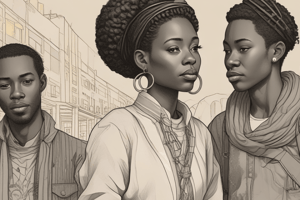Podcast
Questions and Answers
What is a key aspect of sociological analysis related to race and ethnicity?
What is a key aspect of sociological analysis related to race and ethnicity?
- Exploring political ideologies
- Examining individual behaviors
- Studying societal structures (correct)
- Analyzing economic factors
How do racial categories typically differentiate groups of people?
How do racial categories typically differentiate groups of people?
- By language spoken
- Based on shared customs
- By biological characteristics (correct)
- Through religious beliefs
Which term refers more broadly to shared customs, traditions, beliefs, and practices among individuals?
Which term refers more broadly to shared customs, traditions, beliefs, and practices among individuals?
- Ethnicity (correct)
- Nationality
- Culture
- Race
In what way do race and ethnicity concepts sometimes overlap?
In what way do race and ethnicity concepts sometimes overlap?
What did the historical understanding of race consider it to be synonymous with?
What did the historical understanding of race consider it to be synonymous with?
Why are race and ethnicity often studied together?
Why are race and ethnicity often studied together?
What do most scholars agree on regarding differences among humans?
What do most scholars agree on regarding differences among humans?
How does ethnicity differ from race?
How does ethnicity differ from race?
What is one factor that can lead to separate ethnicities despite similar genetic makeups?
What is one factor that can lead to separate ethnicities despite similar genetic makeups?
How do migration and assimilation processes impact traditional characteristics associated with ethnicity?
How do migration and assimilation processes impact traditional characteristics associated with ethnicity?
In sociology, what do studies on race and ethnicity help us understand?
In sociology, what do studies on race and ethnicity help us understand?
What insights do researchers gain by exploring the intersection of race, ethnicity, and other societal aspects?
What insights do researchers gain by exploring the intersection of race, ethnicity, and other societal aspects?
Study Notes
Sociology is a field of study that focuses on understanding how social behavior is shaped by human interactions within society and culture. One significant aspect of sociological analysis involves examining issues related to race and ethnicity. These components of identity can play a key role in shaping individual perceptions, group dynamics, and broader societal structures.
Race and ethnicity are often studied together because they both involve classifications based on various traits such as physical appearance, ancestry, cultural heritage, and language. Racial categories have been used historically to differentiate groups of people based on biological characteristics like skin color, hair texture, or facial features. Ethnicity, however, refers more broadly to shared customs, traditions, beliefs, values, practices, and even habits among individuals who share certain common factors. In some cases, these distinctions between races and ethnicities might overlap; for instance, Europeans from Italy may also identify themselves as Caucasian due to their biological similarities with others classified under this racial category. However, Italians would still consider themselves ethnically distinct from other European populations.
The concept of race has evolved over time. Initially, it was considered synonymous with ethnicity, suggesting an intrinsic connection between bloodline and ancestral origins. Nowadays, while there remains debate around whether or not 'races' exist scientifically, most scholars agree that differences among humans are primarily genetic rather than categorical. It is argued that any perceived difference between so-called races is far too small to necessitate any separation into discrete groups. Nevertheless, despite its controversial nature, race continues to influence how societies organize themselves politically, economically, socially, culturally, etc., often contributing to divisions along those lines.
Ethnicity, conversely, tends to focus more closely on specific cultures and traditions than biologically determined characteristics alone. This means that even though two groups might exhibit very similar phenotypic traits (e.g., skin color) or genetic makeups (e. g., overall DNA), if one group followed an Islamic religion and spoke Arabic, whereas another belonged to Christianity and German, we could call them separate ethnicities. Thus, although many characteristics traditionally associated with ethnicity were once thought to be immutable (like languages spoken), contemporary thinking accepts that people change those things voluntarily or involuntarily through migration or assimilation processes.
In sum, studying race and ethnicity within sociology helps us understand the complex ways humans form identities, and how those identities shape our relationships with each other and our societies. By exploring the intersection of race, ethnicity, and other aspects of society, researchers reveal profound insights into the interconnectedness of all elements affecting human life.
Studying That Suits You
Use AI to generate personalized quizzes and flashcards to suit your learning preferences.
Description
Explore the sociological analysis of race and ethnicity, examining how these components of identity influence individual perceptions, group dynamics, and societal structures. Learn about the historical and contemporary perspectives on race and ethnicity, and how they intersect with culture, traditions, beliefs, and values.




